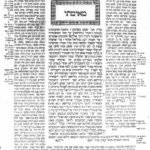
 This would, no doubt, turn into a massive page during the project going through the entire cycle. What I’m going to do is put the section of whichever tractate I’m currently going through on this page, and as I finish them during the cycle, I’ll move the finished one onto a separate linked sub-page. I’m going to organize it as an outline so it’s reasonably easy to follow. I’m also, while well aware of the deep spiritual stuff that’s going on in each discussion, not going to go down that path – there are a zillion websites and commentaries that already do that. In general, I find the idea of a glimpse of a historical culture from what amounts to transcripts of conversations between spiritual and secular leaders to be fascinating, and not surprisingly, for me, I’m particularly drawn to topics that relate to food and wine, sexuality, and comedy.
This would, no doubt, turn into a massive page during the project going through the entire cycle. What I’m going to do is put the section of whichever tractate I’m currently going through on this page, and as I finish them during the cycle, I’ll move the finished one onto a separate linked sub-page. I’m going to organize it as an outline so it’s reasonably easy to follow. I’m also, while well aware of the deep spiritual stuff that’s going on in each discussion, not going to go down that path – there are a zillion websites and commentaries that already do that. In general, I find the idea of a glimpse of a historical culture from what amounts to transcripts of conversations between spiritual and secular leaders to be fascinating, and not surprisingly, for me, I’m particularly drawn to topics that relate to food and wine, sexuality, and comedy.
- Seder Zeraim – “Book of Seeds”
- Berakhot – “Blessings” – Blessed things, actions, and events
- I hit a momentary “WTF?” when Berakhot finished and we didn’t move on to Pe’ah, the next tractate in Zeraim. Apparently the remaining ten tractates in Zeraim do not have Gemara commentary in the Babylonian Talmud, just the Jerusalem Talmud, which the Daf Yomi doesn’t cover. Despite living in a predominately agrarian society, the Babylonian rabbis apparently had nothing to say on agriculture and related subjects like tithing, offerings, and challah bread. Though now I get “Book of Seeds”, I do feel a bit cheated and I want to know if there’s a good challah recipe in there. My plan is to at some point read through the various tractates throughout the Talmud that aren’t included in the Daf Yomi, just out of curiosity. I’ll put those in a different color so that they stand out.
- Pe’ah – “Corner” – Pay it Forward
- Demai – “Doubtful” – Provenance and Taxes
- Kil’ayim – “Mixed Species” – Mixing it up in the Fields
- Shevi’it – “Seventh” – Taking a Sabbatical from Life
- Terumot – “Donations” –
- Ma’aser Rishon – “First Tithes” –
- Ma’aser Sheni – “Second Tithes” –
- Challah – “Dough” –
- Orlah – “First Fruits of Trees” –
- Bikkurim – “First Fruits” –
- Seder Moed – “Book of Festivals”
- Shabbat – “Sabbath” – The Day of Rest
- Eruvin – “Community Spaces” – Creating Shared Space
- Pesachim – “Passovers” – Recreating the Jewish People
- Shekalim – “Shekels” – Taxes of Renewal
- Yoma – “The Day” – Hard to Say I’m Sorry
- Sukkah – “The Hut” – Founding the Jewish Nation
- Beitza – “The Egg” – Making it all Social
- Rosh Hashanah – “Head of the Year” – Finding Yourself in Time
- Ta’anit – “The Fast” – Hunger Strikes
- Megillah – “Scroll” – Rules of the Read
- Mo’ed Katan – “Little Festival” – What Can You Do?
- Chagigah – “Festival Offering” – Nu, What Can I Bring?
- Seder Nashim – “Book of Women”
- Yevamot – “Brother’s Wife” – Clan Survival
- Ketubot – “Written” – I Do
- Nedarim – “Vows” – I Won’t
- Nazir – “Abstinent” – I’m Yours Forever… or a Month
- Sotah – “Errant Wife” – How Can I Trust You Again?
- Gittin – “Divorce Documents” – Parting Glances
- Kiddushin – “Betrothal” – You’re Mine, All Mine!
- Seder Nezikin – “Book of Damages”
- Bava Kamma – “The First Gate” – Who’s Responsible?
- Bava Metzia – “The Middle Gate” – Who Owns the Truth?
- Bava Batra – “The Last Gate” – You’re Responsible, and Here’s Why
- Sanhedrin – “Assembly” – Judging You
- Makkot – “Lashes” – Whip It, Whip It Good
- Originally, Makkot was simply the second part of Sanhedrin, the tractate we just finished. While the former focused on the design of the court system and its overall responsibilities for various types of crimes, Makkot focuses on the Bet Din, the Halakhic court, i.e., the rabbinical court that judges violations of religious law. More specifically, the tractate covers three subjects: false witnesses (thou shalt not lie/bear false witness); sanctuary cities (you thought those were a new, California based thing, right?); and punishment by flogging (lashes).
- 4/15/25, Chapter 2, Page 7 – We’ve encountered the topic of “intent” numerous times over the last few years of exploring the Talmud. But I feel like this time perhaps they’ve stretched the definition a bit too far. The example used is someone fixing a roof, and either using a roller to spread tar, or raising/lowering a barrel of tar, or climbing on a ladder. If, the rabbis decide, your action is away from potential danger – i.e., pulling the roller away from the edge, raising the barrel, or climbing up the ladder, and a slip occurs, and you or the barrel/roller falls on someone and kills them, it is considered unintentional and accidental. However, if you are pushing the roller towards the edge, lowering the barrel, or descending the ladder, and the slip occurs, then it is considered intentional, because you should have been more careful, and you are exiled.
- 4/16/25, Page 8 – We continue in the vein of intention, and a curious dive into unintended consequences of a mitzvah. Examples given are a father disciplining his son, a teacher disciplining a student, an agent of the court disciplining a prisoner. If those things are being performed as a mitzvah, the first two centering around Torah instruction, the last around a court’s sentence, and the victim dies, the perpetrator is found not liable for exile. If, on the other hand, they are disciplining the victim for something unrelated to Torah learning or a court sentence, then they are liable, and punished by exile. Pay attention in Torah class kids!